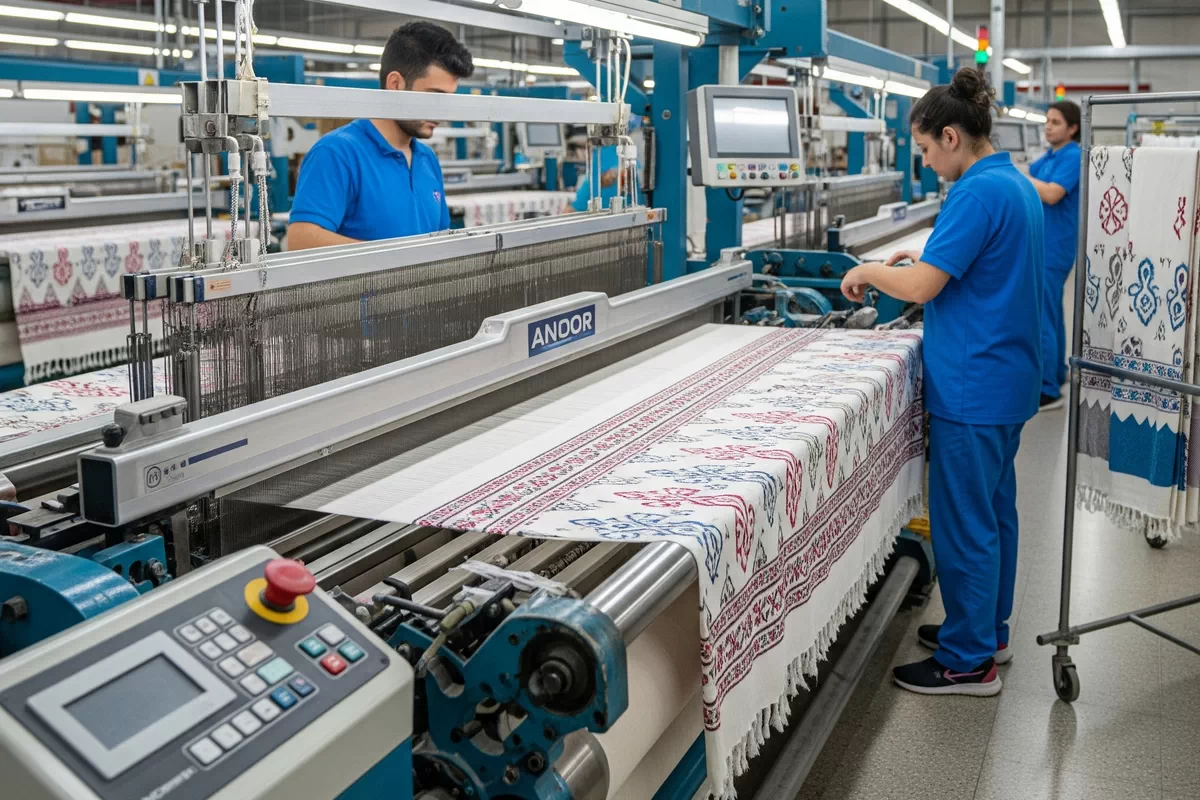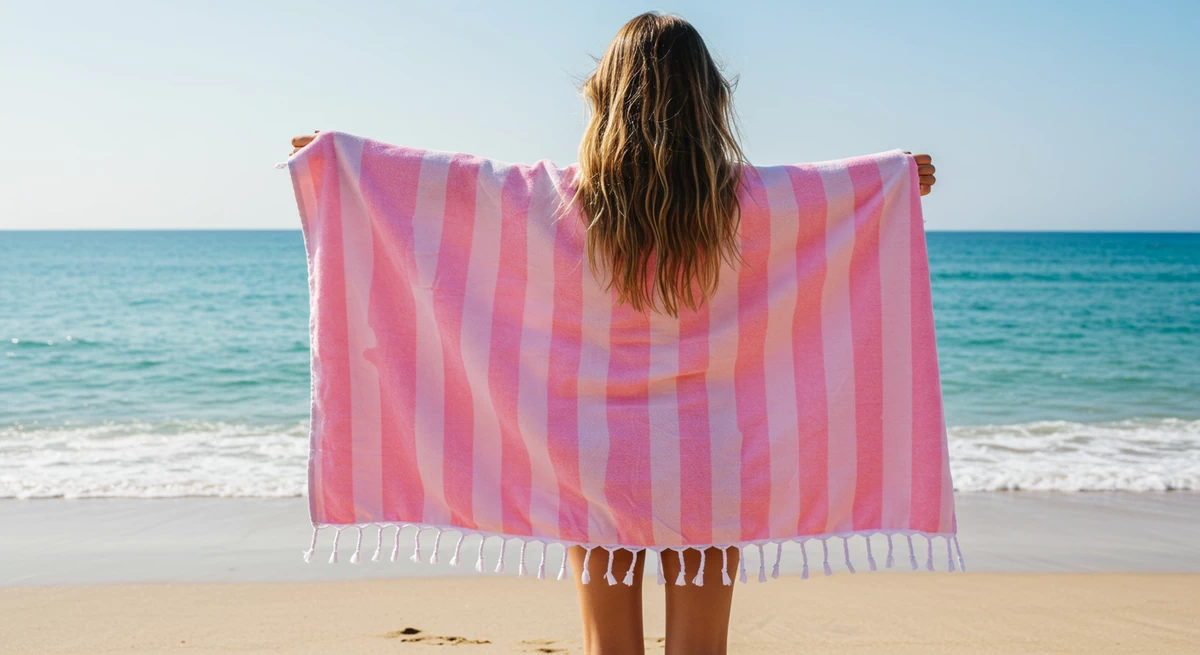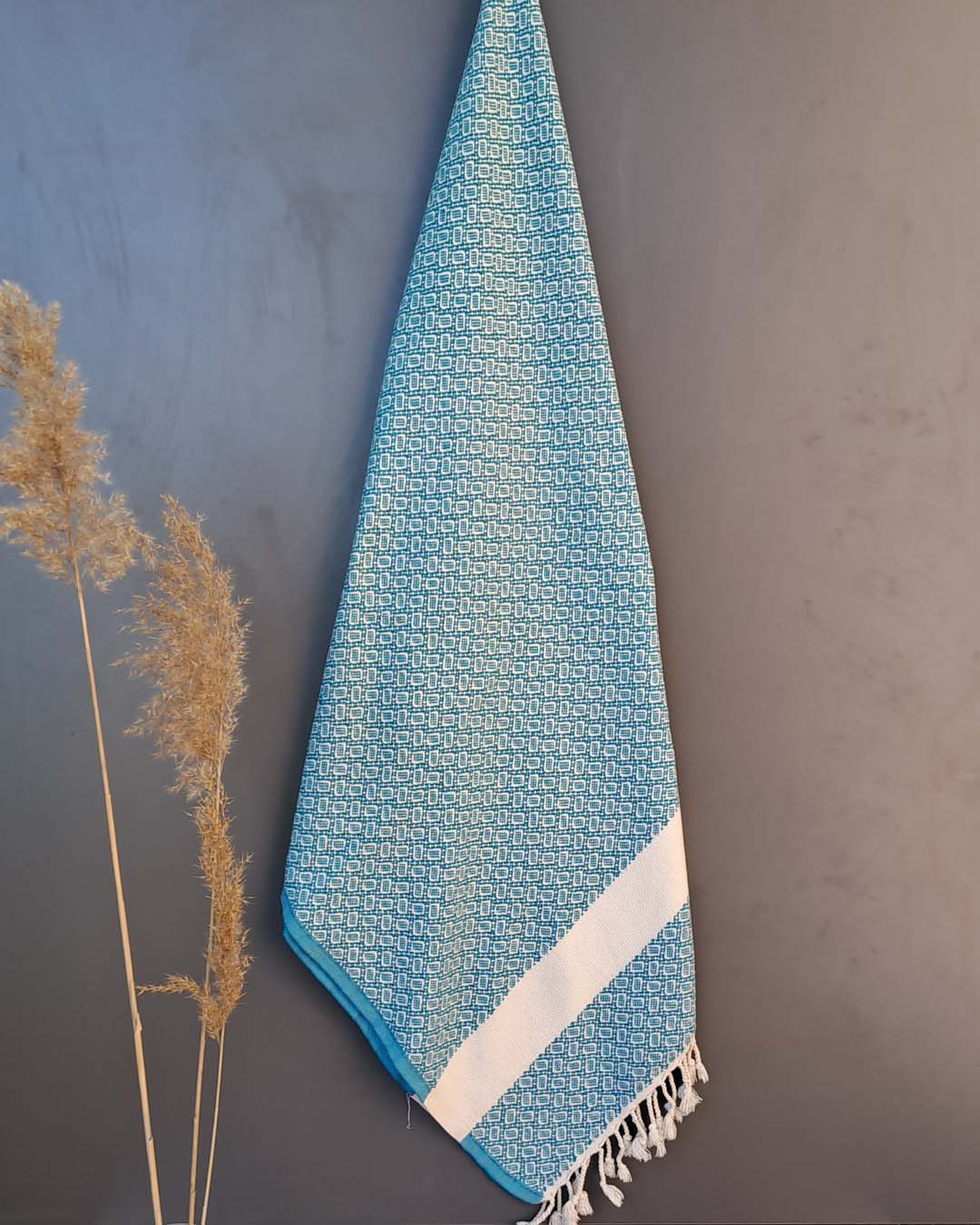Peştemal is more than just a long-standing Anatolian tradition; today, it is repositioning itself as a natural, stylish, and versatile textile product around the world. However, in this growing market, it takes more than just a unique idea or a good brand name to stand out. One of the most critical steps on the road to success is working with the right peshtemal manufacturer.
For boutique brands, entrepreneurs, or retailers looking to produce in bulk, choosing the right manufacturer directly impacts every aspect of the process—from product quality and delivery times to customer satisfaction and brand image. Selecting the wrong manufacturer can result in financial and reputational losses for your brand and undermine your credibility in the market.
So, how do you choose the right manufacturer? What criteria should you use to evaluate them?
In this guide, as a manufacturer with years of experience in peştemal weaving and custom production services, we share the answers to these questions with you, backed by our real-world production experience.
Whether you are just starting your brand or looking to expand your product range, the 7 critical criteria you will learn in this article will help you choose the right manufacturer and build your brand on a solid foundation.
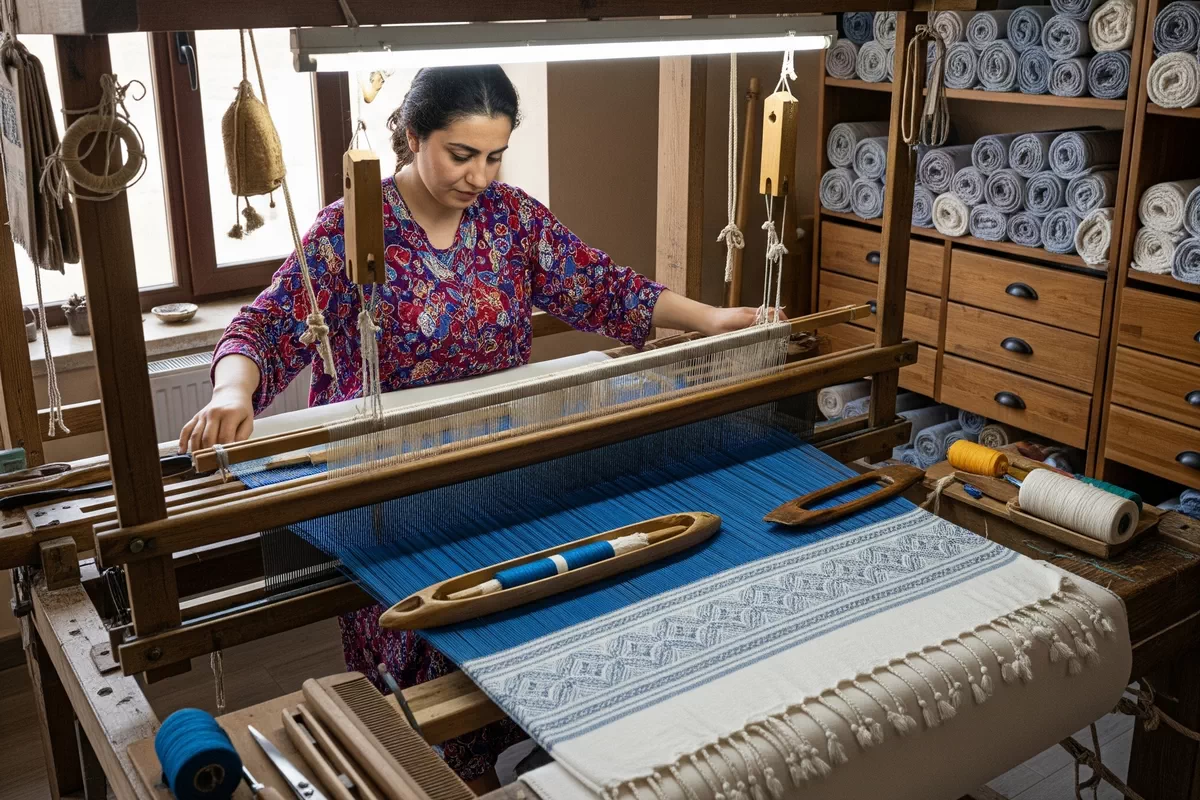
This article may interest you. Custom Wholesale Peştemal Towel Production from Denizli for Global Brands
7 Critical Criteria for Choosing the Right Peshtemal Manufacturer
Criterion 1: Manufacturer’s Experience and References
For traditional products such as peshtemals, which require technical knowledge, the manufacturer’s experience and industry expertise are key indicators of quality and reliability. This is because this business is not just about weaving fabric; it also requires conscious management of the yarn, pattern, weight, dyeing technique, and intended use.
🔍 Why is experience important?
A manufacturer with years of experience in the industry:
- Knows the product needs of different markets
- Can anticipate technical issues that may arise with the fabric
- Can manage the production process more efficiently and on time
- Closely follows fashion and user trends
- Accurately analyzes the expectations of wholesale buyers
In a field that requires precision, such as hand-woven peshtemal production, experience directly reflects on quality.
🧾 References and Previous Projects
Knowing who your manufacturer has worked with before and which markets they ship to gives you a big advantage in the selection process.
A good manufacturer typically:
- Can provide references from boutique brands or chain stores they have worked with previously
- If they have worked with clients of a similar scale, they will better understand your needs
- Can demonstrate their production capabilities by providing sample examples
🔗 Tip: Request samples of previous productions or customer references during your initial communication with the manufacturer.
❗ Things to keep in mind
- Newly established manufacturers or those with no experience in the industry may seem attractive due to their low prices, but they may pose risks in terms of quality and consistency.
- Observing the work of manufacturers who have social media or websites and reviewing comments will make your selection process easier.
- Pay attention to whether the manufacturer can support you not only in the “production” but also in the “branding” processes.
In short: An experienced and referenced peshtemal manufacturer can be not only a supplier for you, but also a long-term partner.
Criterion 2: Weaving Quality and Material Standards
Peshtemals are, in a sense, a combination of simplicity, naturalness, and functionality. However, in order for these three characteristics to be truly felt, every detail must be meticulously planned, from the yarn used to the weaving technique. Therefore, when choosing the right manufacturer, weaving quality and material standards are among the key factors that must be considered.
🧶 Which Yarn, Which Quality?
The most commonly used yarn types in peshtemal production are:
- 100% Cotton: The most classic and natural solution. Ideal for softness, absorbency, and breathability.
- Bamboo: Has natural antibacterial properties. Preferred for spa and wellness brands.
- Linen: Offers a thicker texture and rustic look. Highly durable.
- Micro cotton or blended yarns: Provides advantages such as lightness and quick drying.
The right manufacturer should be able to offer you the most suitable yarn alternatives according to your target audience and intended use, as well as provide technical advice.
🔬 Use of Certified and Reliable Materials
When it comes to material quality, it is not only the feel that matters, but also certificates and sustainability labels:
- OEKO-TEX® Standard 100: An internationally recognized certification for products free of harmful chemicals.
- GOTS (Global Organic Textile Standard): Covers the use of organic cotton and environmentally friendly production processes.
- ISO Certificates: Demonstrate the quality of general production management systems.
Such certificates not only enhance the trust in your brand but also strengthen your position against international buyers if you are considering e-export.
🧵 Weaving Technique and Details
The texture, appearance, and durability of a peştemal are directly related to the production technique used:
- Is it handwoven or machine-woven?
- What is the warp density and weft yarn density?
- Are the edge seams and fringe details done by hand?
- Are processes such as ironing, washing, and pre-drying applied?
A good manufacturer will share these details with you transparently and, if necessary, send samples so you can see the quality for yourself.
✅ Test Suitability for Your Brand
Every product can be high quality; however, not every high-quality product is suitable for your brand.
- If you are a spa brand, absorbency and softness are priorities
- If you are a beach brand, lightness and quick drying are important
- If you have a boutique store, aesthetic patterns and uniqueness are key
Your manufacturer should be aware of these differences and tailor their production recommendations accordingly.
In summary:
A good manufacturer doesn’t just produce fabric; they work with you to determine the most suitable texture and quality for your brand’s needs and develop solutions together.

Criterion 3: Customization Capacity and Design Support
Consumers are moving away from “one-size-fits-all” products. Especially for boutique brands, the uniqueness of the product is as important as carrying the brand identity. Therefore, your peshtemal manufacturer’s ability to offer customization options is key to staying ahead of the competition.
🎨 Product Customization Options
A good manufacturer does not just offer you a few ready-made models; it can integrate the following differentiation options into its production line:
- Pattern and color selection: Custom dyeing according to Pantone codes
- Size changes: Beach, spa, children’s, or hammam sizes
- Fringe and edge details: Hand-tied, knitted, stitch type
- Fabric choice: Herringbone, plain weave, jacquard patterns
- Labeling: Brand label, washing instructions, hanging tag
- Packaging: Sustainable solutions such as kraft wrapping, boxes, bags, and cardboard packaging
This way, your peshtemal product will be both functional and completely unique to you.
🧑🎨 The Advantage of Working with a Manufacturer That Offers Design Support
Not every brand has its own graphics and design team. In this case, your manufacturer should have:
- Experience in pattern development
- Creative guidance during the collection creation process
- The ability to provide sample drawings with their own design team if necessary
- The ability to work in technical drawing and production-friendly file formats
such skills are a great convenience.
This support saves time and money, especially for brands targeting “private label” or “special collections.”
📦 Details That Reflect Your Brand Identity
The product representing your brand should not be ordinary.
- Every detail should tell your brand’s story.
- It should offer a consistent identity from packaging to labeling.
- When the customer opens the box, they should feel like they’ve received something special.
A good manufacturer plans and implements these touches that reflect this feeling during the production process.
Remember:
Today’s buyers aren’t just buying peshtemals — they’re buying an experience that belongs to your brand.
Criterion 4: Minimum Order Quantity (MOQ) and Flexibility
Whether you’re a new entrepreneur or a boutique business looking to expand your product range, it may not always be possible to produce large quantities.
Therefore, the approach of the peshtemal manufacturer you work with regarding the Minimum Order Quantity (MOQ) is critical to the sustainability of your business.
🔢 What is MOQ and Why is it Important?
MOQ is the minimum order quantity that a manufacturer accepts.
- It can vary between different manufacturers, such as 50, 100, or 500.
- A low MOQ means a lower-risk start for new brands.
- It offers flexibility for those who want to produce small quantities for samples and pre-testing.
A good manufacturer understands this need of growing brands and supports them with low-volume production.
⚖️ Flexible Production Capacity = True Business Partner
Manufacturers that only work with large orders may not be suitable for boutique brands.
A good peshtemal manufacturer:
- Allows you to work with small quantities in the first stage
- Plans according to the order volume that will increase over time
- Can offer special offers for collection tests and pilot productions
Some manufacturers may be able to adjust the minimum quantity for a specific product group or offer solutions such as mixed model production (e.g., 50 different designs).
💡 Ideal Scenario for New Brands
If you are starting a new brand:
- Look for manufacturers who can start with 50-100 pieces
- Establish a strategy to start small and transition to larger batches over time
- Remember that unit costs may be slightly higher with low MOQ production; however, the return on this investment is significant
📈 Scalability and Long-Term Partnership
Working with a flexible manufacturer supports not only your current needs but also your future growth.
- Seasonal collections
- Special campaign productions
- Limited edition “special series” products—you can move forward with confidence with the same manufacturer for projects like these.
In summary
A good manufacturer sees your growth potential and doesn’t pressure you with high volume requirements; instead, they are eager to grow with you.
Criterion 5: Delivery Time and Process Tracking
In peshtemal production, on-time and complete delivery of orders is just as critical as quality. Especially when it comes to seasonal campaigns, e-commerce inventory management, or chain store agreements, delivery time becomes a key determinant of your commercial success.
⏱️ Realistic and Commitment-Based Timelines
A good manufacturer, when providing a delivery date, takes into account:
- Raw material procurement time,
- Weaving and production line capacity,
- Dyeing/finishing processes,
- Packaging and shipping plans, and provides a realistic plan.
Avoid manufacturers who promise “early delivery” but then constantly delay. Transparency and realism at the outset prevent all future problems.
🚚 Factors Affecting Delivery Time
The following factors can be decisive in delivery timing:
- Seasonal demand (e.g., summer season orders)
- Order quantity
- Special color or design requests
- Packaging options
- Sample approval process
Professional manufacturers share these variables from the outset and create a timeline for each one.
📦 Process Tracking: Information at Every Stage
Working with a manufacturer who keeps you regularly informed throughout the production process allows you to establish a solid foundation for your operational plans.
An ideal process tracking should proceed as follows:
- Order confirmation and production schedule
- Start of weaving – notification
- Sample control and revision process (if applicable)
- Quality control notification upon completion of production
- Shipping/logistics information and estimated arrival time
The manufacturer can provide this communication via email, WhatsApp, project management panel, or other tools.
🔍 Rush Orders and Flexibility
At certain times, you may need to place rush orders.
A good manufacturer:
- Should have rush production capacity
- Should be able to offer quick solutions with fabric in stock or ready-made models
- Work with logistics partners to expedite shipping
Such flexibility offers significant advantages in ensuring the continuity of your business.
Remember:
Delivery management is just as important as production quality in determining your brand’s reliability.
Even the highest quality product can damage your brand image if it is not delivered on time.
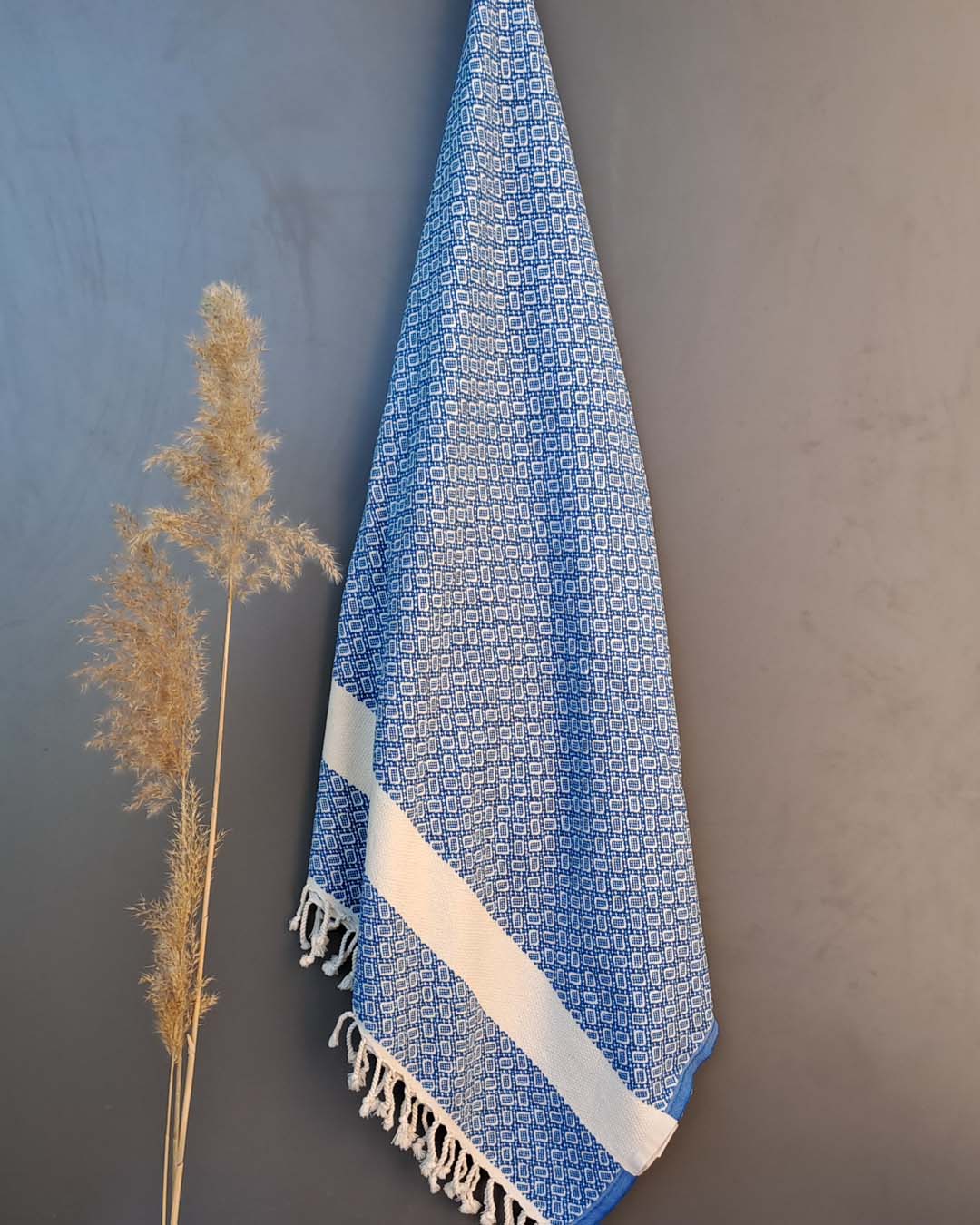
Criterion 6: Communication Skills and Honest Approach
The business relationship you will maintain with your peshtemal manufacturer is not just a commercial relationship; it is also a matter of trust.
As much as product quality, the manufacturer’s communication style, transparency throughout the process, and ability to keep their word form the basis of your long-term cooperation.
🗣️ How Does a Good Manufacturer Communicate?
Professional manufacturers:
- Respond quickly and clearly
- Clarify details before placing an order
- Keep you informed throughout the process (updates, photos, videos, etc.)
- Take your feedback into consideration and approach it with respect
- Focus on solutions rather than excuses when a problem arises
Even in the first communication, the producer’s approach gives you clues about whether you can work with them in the long term.
📉 Risks of Dishonest Approaches
Unfortunately, some producers:
- Present features that do not exist
- Understate the production time
- Convince you with price negotiations but compromise on quality at delivery
- Ignore revision requests or demand additional fees
While such approaches may seem appealing at first, they can harm your brand in the long run.
🤝 Long-Term Trust and Respect
A good manufacturer wants to build a relationship based on trust with you.
They don’t see you as just “an order,” but as a brand partner.
This ensures that in every new production process:
- You progress faster
- You experience fewer revisions
- You understand each other better.
This type of communication also improves production quality over time.
In summary:
Quality production is not just about machines; it requires good communication and honesty.
A trustworthy manufacturer helps you build trust with your customers.
Criterion 7: Sustainability and Social Responsibility
Today’s consumers pay attention not only to the quality of a product, but also to how it is produced, by whom, and its impact on the planet.
Therefore, the environmental and social responsibility awareness of the peshtemal manufacturer you work with is of great importance in reflecting your brand values.
🌱 Environmentally Conscious Production
Sustainable production is not only about respecting nature; it is also the foundation of brand reputation.
A good producer:
- Uses recyclable packaging
- Optimizes water consumption and energy use
- Uses natural dyes and eco-friendly finishing processes
- Uses certified fibers and fabrics (GOTS, OEKO-TEX, etc.)
These practices are good for the environment and strongly reflect your brand’s vision to consumers.
👥 Ethical Working Conditions
A quality manufacturer develops not only products but also a people-centered production culture:
- Provides fair wages and a safe work environment for employees
- Follows a clear policy against child labor
- Supports women’s employment
- Contributes to regional development
If “sustainable” is more than just a marketing term for your brand, you should demand transparent information on these issues when selecting a manufacturer.
♻️ Customer Awareness and Brand Recognition
Many consumers now research “how a product is made” before looking at the label.
If you position your brand with this awareness:
- You should be able to share your manufacturer’s sustainability policies with your customers
- Working with a manufacturer that supports social responsibility projects also adds PR value to your brand
- Your green marketing strategies should align with your manufacturer’s practices
In short:
The brands of the future are not just those that offer quality products, but also those that work with manufacturers that create value.
Conclusion: Build Trust in Your Brand with the Right Manufacturer
Peshtemal is not just a traditional textile product; it is also the carrier of your brand, a symbol of your quality, and the most tangible form of the bond you have established with your customers. Therefore, every detail you pay attention to when choosing a manufacturer to work with directly affects the future of your brand.
The 7 criteria we’ve shared in this article—from experience to material quality, delivery times to sustainability—provide a strong guide to help you find the right manufacturer.
✔️ Your manufacturer brings your product to life,
✔️ Your customers love that product,
✔️ And your brand grows through this chain of trust.
👋 Who are we?
We are a manufacturing workshop that has been producing hand-woven and custom-made peshtemal towels in Denizli for many years.
We manufacture wholesale, develop custom designs for boutique brands, and support new entrepreneurs with low MOQ.
If you’re looking for the right manufacturer for your brand, we’d be delighted to meet you and create customized solutions tailored to your needs.
📩 Contact us to request a quote, order samples, or learn more.
Your brand’s fabric is in our hands, your vision is in your hands.

